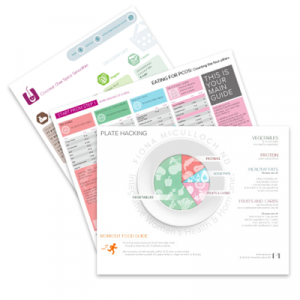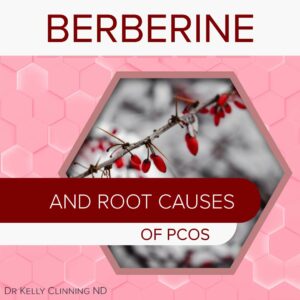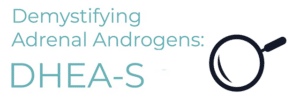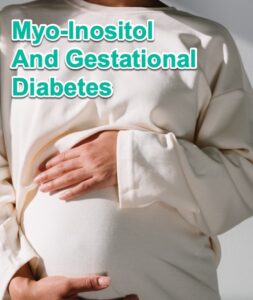Get Naturopathic Treatment for PCOS in Toronto
Our founder and medical director, Dr Fiona McCulloch is the author of the amazon best seller “8 Steps to Reverse Your PCOS“, has led numerous practitioner training courses and treated thousands of patients with this condition. Because of our founder’s close ties to Polycystic ovary syndrome, (PCOS) is of special interest for all our practitioners who regularly assist patients with its symptoms.
PCOS is the most common hormonal condition, affecting an estimated 10-20% of females. The name PCOS can be confusing as many women with the condition don’t have ovarian cysts at all. Rather, PCOS represents a set of hormonal “imbalances” that affect the entire body for the lifespan.

Let Us Help You Reverse Your PCOS Symptoms
Patients with a family history of PCOS or diabetes are more at risk and the World Health Organization estimates that 116 million or more women are affected worldwide. Studies have found that up to 75% of individuals are undiagnosed, yet continue to suffer with the symptoms of PCOS.
How is PCOS Diagnosed?
PCOS may be diagnosed when a woman has two of the three following criteria (known as the Rotterdam Criteria)
Anovulation (lack of ovulation) or delayed ovulation
Anovulation is characterized by more than a span of 35 days between periods.
High levels of androgens
Androgens include testosterone and similar hormones or clinical signs of high androgens like hirsutism (facial hair growth), cystic acne or hair loss.
Polycystic ovaries seen on an ultrasound
This is more common in younger women and often disappears with age.
PCOS Symptoms
PCOS can cause a wide variety of stressful and troublesome symptoms. To make matters even more challenging, PCOS symptoms can change at different times of life.
Symptoms of PCOS Include:
- cycles that are absent or far apart
- acne, especially cystic or jawline acne
- boils and hidradenitis suppurativa
- hair loss, particularly on the top of the head
- hirsutism or hair growth on the face, chest and under the belly-button
- infertility or subfertility
- abdominal weight gain
- difficulty losing weight despite working hard at diet/exercise
- skin tags
- darkened skin patches or hyperpigmentation (acanthosis nigricans)
- mood disorders including anxiety, depression and eating disorders
- chronic low grade inflammation
- fatty liver disease
Naturopathic Lab Testing for PCOS
Polycystic Ovary Syndrome varies from patient to patient and changes throughout the lifespan. To understand the factors in your case our naturopaths typically suggest specific tests related to your symptoms, presentation and health goals. For example, we may order different testing for a patient with PCOS who is trying to conceive, versus a patient who is dealing primarily with hair loss or alopecia.
For women who are cycling, lab tests for PCOS are performed on specific cycles days. For those who aren’t cycling, or for PCOS patients in menopause that’s OK – we can run these tests anytime.
Some tests we commonly order for patients with PCOS include:
- Progesterone and Estradiol (timed typically 5-7 days after ovulation if cycling)
- FSH and LH (timed on cycle day 2 or 3 of the cycle)
- Total Testosterone
- Androstenedione
- Free Testosterone
- DHEA-S
- Sex Hormone Binding Globulin
- Fasting Insulin or the 2-Hour Insulin Glucose Challenge
- hs-CRP
- HBA1C
- Cortisol
- Thyroid panel (TSH, free T3, free T4, Thyroid Autoantibodies)
- DUTCH testing for hormone metabolites
Naturopathic Treatment of PCOS in Toronto
PCOS includes a wide spectrum of types (see below) and the way it affects a woman can change throughout her life. Women with PCOS have very different needs in times of adolescence, during the reproductive years and through the perimenopausal transition and post menopause. We always focus on what you need, when you need it, with our unique approach to PCOS.
Our Naturopathic Treatments for PCOS May Include:
- Natural Supplements to manage insulin resistance and inflammation in PCOS
- Sustainable Dietary Approaches for PCOS to Increase Insulin Sensitivity
- Cyclic Bio-Identical Progesterone Therapy for PCOS to Reduce Androgens and Regulate Cycles
- Anti-Androgenic Botanical/Herbal Medicines for PCOS including custom formulations
- Management of hypothyroidism or Hashimoto’s Thyroiditis (commonly associated with PCOS)
- Naturopathic Approaches for Adrenal Androgen Excess and Stress in PCOS
- Naturopathic Fertility care specific for PCOS for those trying to conceive
- Assistance in Discontinuing Oral Contraceptive Medications
- Support for the Unique Needs for Mood and Mental Health in PCOS
- PCOS-Specific Environmental Health guidance
Naturopathic Nutrition for Classic or Insulin-Resistant PCOS


PCOS is a complex hormonal condition affecting the entire body, including hormones, metabolism, fertility, and the brain and immune system. PCOS has genetic and epigenetic origins, and certain environmental and dietary factors can make it worse.
Dr. Fiona McCulloch ND - Medical Director of White Lotus Clinic and Author of Best-Seller "8 Steps to Reverse Your PCOS"
Let us take the mystery out of PCOS for you
Naturopathic Treatments for Lean PCOS
Lean PCOS is a condition which can be very confusing to practitioners and patients alike. Many patients with lean PCOS may not have significant insulin resistance and often are placed on restrictive diets with little to no benefit.
These diets can be stressful and don’t address the root causes of problems in lean PCOS. However, some patients with lean PCOS may have milder insulin resistance or reactive hypoglycemia, so it is important to identify and treat these elements if present.
With lean PCOS, however the main focus is generally placed on managing the root cause of androgen excess. A careful analysis of different types of androgens (including testosterone and adrenal androgens), progesterone, estradiol, and pituitary hormones FSH and LH provide a full understanding of the imbalances in patients. The best clinical results for lean PCOS are often achieved with some or all of: anti-androgenic natural treatments, cyclic progesterone therapy, adrenal androgen support and researched based supplements to support hormonal signalling.
FAQS on Naturopathic PCOS treatment
How Can a naturopath help with PCOS?
PCOS is a complex condition that presents in many ways, through various life stages and is particularly well-supported by our individualized naturopathic approach to care. Taking a holistic approach to PCOS allows patients to be fully supported for their specific needs at the time, while preventing future health problems. Our naturopaths offer diagnostics, nutrition, supplements, herbal medicines and bioidentical hormone replacement therapies to support our patients in managing their symptoms of PCOS.
What are the 4 types of PCOS?
The Official Types or Phenotypes
There are four main phenotypes of PCOS as outlined in Dr. Fiona’s book “8 Steps to Reverse Your PCOS”. These types are based on the Rotterdam criteria listed above. The first consideration is that to be diagnosed with a “type” other conditions must be excluded first.
- Type A is also known as “Classic” PCOS. It includes all 3 symptoms: hyperandrogenism (too much testosterone or similar hormones) , polycystic ovaries on ultrasound, and anovulation or delayed ovulation. Type A PCOS patients are the most likely to be insulin resistant and to have metabolic dysfunction.
- Type B includes both hyperandrogenism and anovulation.
- Type C includes both hyperandrogenism and polycystic ovaries- with normal ovulation.
- Type D includes polycystic ovaries and anovulation.
However, there are major problems with these as static types. The Androgen Excess Society states that PCOS is a condition based in hyperandrogenism, and that this factor must be present in all conditions of PCOS. This would mean that Type 4 is not truly a type of PCOS.
We tend to agree. If there are no clinical symptoms OR lab values suggesting high levels of androgens/testosterone, our naturopathic doctors will look for other potential causes of anovulation and polycystic ovaries. Polycystic ovaries and delayed ovulation is common in adolescents, after stopping birth control pills, in hypothalamic amenorrhea and in other situations of hormonal imbalance.
Other Types and Variations of PCOS including Classic and Lean PCOS
-------------------------------------------------There is a major difference between what is commonly described as “lean” and “classic” PCOS. Patients with “Classic” PCOS often have insulin resistance, and have difficulty losing weight around their abdomen despite great efforts. Excess insulin in these patients directs the ovaries to produce testosterone, adding into the cycle of PCOS. Most patients with classic PCOS have a great deal of inflammation, since insulin resistance causes inflammation.
To learn more about the cycle of PCOS and how insulin plays a role, please read this article and diagram here.
Once you have viewed the diagram above, it's easy to see that “Lean” PCOS is quite different from “Classic” PCOS. We see a great many patients at the clinic with lean PCOS who come in following strict diets, taking supplements and are not seeing any change at all. This is because these treatments are focused on the incorrect area. Patients with lean pcos often have androgen excess, a deficiency of progesterone and/or estrogen and many also have adrenal androgen excess. Patients with lean PCOS generally do not benefit when all the treatment is focused on insulin resistance. Some patients with lean PCOS will have inflammation but as a whole it is generally seen less than in classic PCOS. In lean PCOS, inflammation may or may not be present. We find that cyclic progesterone therapy is exceptionally helpful in treating lean pcos.
Adrenal PCOS
Adrenal PCOS is another subtype where the predominant androgen in the patient is DHEA-S.
We do consider adrenal PCOS to have some unique characteristics and therefore do offer specific support for this condition. The main adrenal androgen, DHEA-S is unable to activate the androgen receptor in cells directly. It must be turned into testosterone to become an active androgen in the ovaries and tissues. Therefore, it is almost always true that the ovaries are involved as well and the degree to which adrenal androgen excess is a problem varies from person to person. Factors to consider include whether the patient has high levels of cortisol, testosterone/direct androgens and if ovulation is affected.
Estrogen and Progesterone Levels in PCOS
During their reproductive years, patients with PCOS commonly have difficulties with hormones such as progesterone or estrogen. At our clinic, we consider these to be “factors” that are unique to individuals and must be individually assessed. It is definitely a myth that all patients with PCOS have high levels of estrogen. In fact, we see that a large subset of patients actually have low levels of estrogen for much of the time. Most patients with PCOS have low levels of or exposure to progesterone.
Inflammation in PCOS
Inflammation is common in Classic, Insulin resistant pcos since insulin resistance is a driver of inflammation. In general, we screen all of our patients for inflammation through blood testing. Other causes of inflammation in PCOS vary from patient to patient and include androgen excess, autoimmunity, infections, allergies, histamine and gut problems. This is always assessed in a holistic manner.
Can adrenal PCOS go away?
Adrenal androgens such as DHEA-S do naturally decrease with age. As a woman enters her mid 30s, adrenal androgens may decrease to the normal range. The same is also true for testosterone levels which can normalize with age (though to a milder degree) In perimenopause in PCOS, however levels of adrenal androgens may temporarily rise again.
It is important to understand once again that the adrenals are only a source of androgen precursors and that if levels have normalized, the overall health picture of PCOS may still be present. This can be identified easily through assessment with your naturopathic doctor. PCOS is generally considered to be a lifelong condition so even though specific elements may improve, there are always new considerations for each life stage.
Which exercise is best for PCOS?
Exercise is a key component of health for women with PCOS. Exercise benefits insulin resistance, mood, and boosts metabolic rate!
Although many types of exercise can be helpful for PCOS there are certain types that seem to provide the most benefit. First, the best type of exercise is the type you enjoy and the type you will do! Outside that, there are generally a few types of exercise that stand out for PCOS.
Strength Training in PCOS
- Strength training can provide a major metabolic benefit for women with PCOS.
- A great place to start is by building your lower body strength — the leg muscles have the most impact for PCOS.
Key Strength Building Lower Body Exercises for PCOS:
- Squat
- Lunge
- Deadlift
- Step-Ups
-
HIIT — High Intensity Interval Training
For patients who enjoy cardiovascular exercise, HIIT training has been found to benefit PCOS. This exercise is more intense and should not be performed by those with exhaustion, debilitation.
What should not be eaten in PCOS?
There really are no foods that should “not” be eaten in PCOS. We focus on the “dos” rather than the “don’t’s”. Rather than cutting foods out, it is beneficial to follow a balanced diet that provides an array of micronutrients through healthy fats, lean proteins, vegetables, fruits and low glycemic index carbohydrates. At the clinic always educate our patients with PCOS on how to create a balanced meal with healthful choices, and how to proportion different macronutrients to help manage blood sugar and insulin levels. We also provide information on optimal meal timing for metabolic and adrenal health!
How does apple cider vinegar help PCOS?
Apple cider vinegar can support blood sugar levels and glycemic control in PCOS. It also can benefit digestive health, and provides biliary support in the condition.
Recent Articles on PCOS

Berberine and Root Causes of PCOS
Berberine and Root Causes of PCOS Understanding which supplements are going to help reduce your

Curious about DHEA-S or Adrenal Androgens in PCOS?
DHEA-S is an androgen precursor. It is not the same as testosterone, which is a direct androgen.

MyoInositol and Gestational Diabetes
MyoInositol and Gestational Diabetes Gestational diabetes is diagnosed when a woman’s blood sugar levels are






